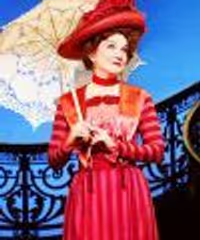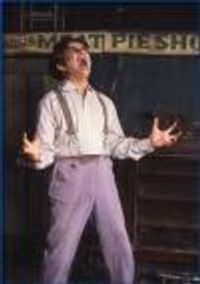Why Aren't Theatre History Classes Mandatory for High Schools?
hearthemsing22
Broadway Legend Joined: 2/14/20
#50Why Aren't Theatre History Classes Mandatory for High Schools?
Posted: 6/6/24 at 5:58pm
SonofRobbieJ said: "I think you may have overestimated how much I might possibly care if you think I'm being realistic or not.
Looking at the arts as a separate thing that needs special funding rather than something that could be woven into existing curricula is the problem. Some of us have spent a lot of time working on these very things. Some of us even have masters degrees in this types of things.
The reason I'm passionate about this is not just because I love and practice theater. It's because we are looking at horrifying results of an undereducated populace that are totally unskilled to think critically about the media and propaganda being fed to them. We are at a critical mass and stand on the precipice of electing that f*cking nightmare...again. We've lied to a few generations of people that if only they focus on STEM, then they'll make lots of money and their lives will be great. But a history class that highlights the way art is used in propaganda?Or an English class that dissects Marc Antony's speech in Julius Caesar will help people recognize the power of political speech to persuade...or manipulate?* We don't need extra money for that.
* I say this as someone who benefitted from exactly that moment in my education."
Did you learn how to care about others when taking any of these classes? Maybe that's what should be taught instead- common courtesy and respect for fellow humans. I'm not perfect, but I'm not targeting you at the same scale you are taking digs at me.
You're speaking from your own personal experience and how you have benefitted. Do you think other people care? Do you think a small high school in North Dakota (just a completely random place I named) is going to want to study those things? You're naming what *you* alone have learned. Can we continue this thread with what other people have learned by having theater history classes, or theater classes?
I did not have a theater class in high school. We had optional theater classes run by two fantastic teachers. I do owe a lot to them. But the program is currently sinking from what I understand because they're not getting enough money. So yes, funds are important.
I'm not getting into politics on here because you can leave that to your social media pages if you're on there.
#51Why Aren't Theatre History Classes Mandatory for High Schools?
Posted: 6/6/24 at 6:31pm
BeingAlive44Ever said: "So I've begun to notice something odd. There are swaths and swaths of theatre kids in this generation, whether I've met them online or through my voice coach or through my friends' kids, who seem to not be well versed in theatre history. And, I know, not everybody has to know anything. But I'm talking basic things. Like not knowing who Sondheim is. Not knowing that Broadway was created by Jewish songwriters and African American musicians. Not knowing what the word "operetta" or even the term "musical comedy" means. Like scary stuff that seems like such common sense. So I looked into it. It turns out thatmosthigh schools don't have a theatre history class. Even if they have a theatre class, it's more common for them to be based entirely on production than for there to beactual history taught. I personally think that at least a fundamental understanding of the history of theatre, especially the theatre medium in which these kids are performing, ie the American Broadway Musical, is required for productions to... I dunno, work? My friend, who is a school drama director but not a drama teacher, told me that she was frustrated with this as well. She often will make allusions to Fosse or specific musicals when explaining how the actors are supposed to move and most of the kids have no idea what she means. I find it disturbing that these kids are expected to perform without any knowledge of what they're doing. Most high schools have detailed courses on Graphic Design andWeldingbut not on Theatre History. Is there some reason for this that I'm unaware of, or is this just another case of the arts not being funded properly?"
Among the other things, I'm also very baffled by how narrow this definition of theatre history is. Surely even if theatre history were taught at school the Broadway musical wouldn't occupy more than a lesson, if they aim to give an overview of everything from Aeschylus to the present day.
#52Why Aren't Theatre History Classes Mandatory for High Schools?
Posted: 6/6/24 at 8:46pm
I had my own Theater History class - myself! I fell in love with Broadway when I saw my first show. Year was 1972 and it was the original cast of PIPPIN at the Imperial Theatre. I was 7 years old and that’s how Bob Fosse entered into my life. Completely curious to learn more, I started going to libraries and spending hours devouring books and books about Broadway history and not only learning about Bob Fosse and his past work in detail, but I learned about countless other shows as well, from flops to now classics. Some of these books I wish I can locate today as they went into so much detail from the exact dates Carol Burnett was out of FADE OUT-FADE IN to the ticket prices of each show and so much more. They were huge reference books so I had to read them at the library since you couldn’t check them out to read at home.
willep
Broadway Legend Joined: 9/20/08
#53Why Aren't Theatre History Classes Mandatory for High Schools?
Posted: 6/6/24 at 9:37pm
darquegk said: "Your average honor student will have read Shakespeare, Arthur Miller and Tennessee Williams in school. If you’re from Pennsylvania or a historically black demographic, add August Wilson. That’s better than nothing."
As someone who grew up in Pennsylvania, my high school had no sort of theatre class/department. There was one musical put on per year, and that was the extent of it. In terms of reading plays in English class, we read Hamlet, Julius Caesar, Our Town, Mister Roberts and maaaaybe The Crucible. Definitely no August Wilson or Tennessee Williams.
#54Why Aren't Theatre History Classes Mandatory for High Schools?
Posted: 6/6/24 at 10:38pm
hearthemsing22 said: "SonofRobbieJ said: "I think you may have overestimated how much I might possibly care if you think I'm being realistic or not.
Looking at the arts as a separate thing that needs special funding rather than something that could be woven into existing curricula is the problem. Some of us have spent a lot of time working on these very things. Some of us even have masters degrees in this types of things.
The reason I'm passionate about this is not just because I love and practice theater. It's because we are looking at horrifying results of an undereducated populace that are totally unskilled to think critically about the media and propaganda being fed to them. We are at a critical mass and stand on the precipice of electing that f*cking nightmare...again. We've lied to a few generations of people that if only they focus on STEM, then they'll make lots of money and their lives will be great. But a history class that highlights the way art is used in propaganda?Or an English class that dissects Marc Antony's speech in Julius Caesar will help people recognize the power of political speech to persuade...or manipulate?* We don't need extra money for that.
* I say this as someone who benefitted from exactly that moment in my education."
Did you learn how to care about others when taking any of these classes? Maybe that's what should be taught instead- common courtesy and respect for fellow humans. I'm not perfect, but I'm not targeting you at the same scale you are taking digs at me.
You're speaking from your own personal experience and how you have benefitted. Do you think other people care? Do you think a small high school in North Dakota (just a completely random place I named) is going to want to study those things? You're naming what *you* alone have learned. Can we continue this thread with what other people have learned by having theater history classes, or theater classes?
I did not have a theater class in high school. We had optional theater classes run by two fantastic teachers. I do owe a lot to them. But the program is currently sinking from what I understand because they're not getting enough money. So yes, funds are important.
I'm not getting into politics on here because you can leave that to your social media pages if you're on there."
I am begging you to learn a little bit of self awareness before you again lecture people on how to treat others.
#55Why Aren't Theatre History Classes Mandatory for High Schools?
Posted: 6/7/24 at 1:00am
How did I miss this thread earlier? I am a drama teacher (high school and middle school), and I teach all of my students basic theatre history. It bores them to death, but I do it anyway, because history is important! And they still get to play lots of dumb theatre games too, so it all works out.
Ensemble1725618521
Swing Joined: 9/6/24
#56Why Aren't Theatre History Classes Mandatory for High Schools?
Posted: 9/6/24 at 11:35am
BeingAlive44Ever said: "So I've begun to notice something odd. There are swaths and swaths of theatre kids in this generation, whether I've met them online or through my voice coach or through my friends' kids, who seem to not be well versed in theatre history. And, I know, not everybody has to know anything. But I'm talking basic things. Like not knowing who Sondheim is. Not knowing that Broadway was created by Jewish songwriters and African American musicians. Not knowing what the word "operetta" or even the term "musical comedy" means. Like scary stuff that seems like such common sense. So I looked into it. It turns out thatmosthigh schools don't have a theatre history class. Even if they have a theatre class, it's more common for them to be based entirely on production than for there to beactual history taught. I personally think that at least a fundamental understanding of the history of theatre, especially the theatre medium in which these kids are performing, ie the American Broadway Musical, is required for productions to... I dunno, work? My friend, who is a school drama director but not a drama teacher, told me that she was frustrated with this as well. She often will make allusions to Fosse or specific musicals when explaining how the actors are supposed to move and most of the kids have no idea what she means. I find it disturbing that these kids are expected to perform without any knowledge of what they're doing. Most high schools have detailed courses on Graphic Design andWeldingbut not on Theatre History. Is there some reason for this that I'm unaware of, or is this just another case of the arts not being funded properly? It's crazy that so many theater kids don't even know basic things like who Sondheim is or the origins of Broadway. Theater history is essential to understanding the plays, and it's surprising how high schools don't make it compulsory. As with any subject, context matters. In fact, I recently had to write an essay on a similar topic and I found https://essays.edubirdie.com/buy-essay this great resource where you can get an essay if you ever get stuck. It will be quality work from professionals. You'd think schools would give this story a higher priority considering how important it is!"
I think making theatre history classes mandatory could really help us appreciate and understand the roots of what we’re performing. It feels weird to act without knowing the basics like Sondheim or Broadway's origins. It's like learning math without knowing addition. The arts deserve the same respect as other subjects! Thanks for telling me about it!
JSquared2
Broadway Legend Joined: 3/23/17
#57Why Aren't Theatre History Classes Mandatory for High Schools?
Posted: 9/6/24 at 2:17pm
Ensemble1725618521 said: "BeingAlive44Ever said: "So I've begun to notice something odd. There are swaths and swaths of theatre kids in this generation, whether I've met them online or through my voice coach or through my friends' kids, who seem to not be well versed in theatre history. And, I know, not everybody has to know anything. But I'm talking basic things. Like not knowing who Sondheim is. Not knowing that Broadway was created by Jewish songwriters and African American musicians. Not knowing what the word "operetta" or even the term "musical comedy" means. Like scary stuff that seems like such common sense. So I looked into it. It turns out thatmosthigh schools don't have a theatre history class. Even if they have a theatre class, it's more common for them to be based entirely on production than for there to beactual history taught. I personally think that at least a fundamental understanding of the history of theatre, especially the theatre medium in which these kids are performing, ie the American Broadway Musical, is required for productions to... I dunno, work? My friend, who is a school drama director but not a drama teacher, told me that she was frustrated with this as well. She often will make allusions to Fosse or specific musicals when explaining how the actors are supposed to move and most of the kids have no idea what she means. I find it disturbing that these kids are expected to perform without any knowledge of what they're doing. Most high schools have detailed courses on Graphic Design andWeldingbut not on Theatre History. Is there some reason for this that I'm unaware of, or is this just another case of the arts not being funded properly?"
I think making theatre history classes mandatory could really help us appreciate and understand the roots of what we’re performing. It feels weird to act without knowing the basics like Sondheim or Broadway's origins. It's like learning math without knowing addition. The arts deserve the same respect as other subjects!"
Always great to get the perspective of a new AI bot.
#58Why Aren't Theatre History Classes Mandatory for High Schools?
Posted: 9/6/24 at 4:15pm
"Why Aren't Theatre History Classes Mandatory for High Schools?"
Tell me you went to a lily white suburban high school without actually telling me!!! ;)
Ensemble001
Swing Joined: 10/4/24
#59Why Aren't Theatre History Classes Mandatory for High Schools?
Posted: 10/4/24 at 11:14am
Ensemble1725618521 said: "BeingAlive44Ever said: "So I've begun to notice something odd. There are swaths and swaths of theatre kids in this generation, whether I've met them online or through my voice coach or through my friends' kids, who seem to not be well versed in theatre history. And, I know, not everybody has to know anything. But I'm talking basic things. Like not knowing who Sondheim is. Not knowing that Broadway was created by Jewish songwriters and African American musicians. Not knowing what the word "operetta" or even the term "musical comedy" means. Like scary stuff that seems like such common sense. So I looked into it. It turns out thatmosthigh schools don't have a theatre history class. Even if they have a theatre class, it's more common for them to be based entirely on production than for there to beactual history taught. I personally think that at least a fundamental understanding of the history of theatre, especially the theatre medium in which these kids are performing, ie the American Broadway Musical, is required for productions to... I dunno, work? My friend, who is a school drama director but not a drama teacher, told me that she was frustrated with this as well. She often will make allusions to Fosse or specific musicals when explaining how the actors are supposed to move and most of the kids have no idea what she means. I find it disturbing that these kids are expected to perform without any knowledge of what they're doing. Most high schools have detailed courses on Graphic Design andWeldingbut not on Theatre History. Is there some reason for this that I'm unaware of, or is this just another case of the arts not being funded properly?It's crazy that so many theater kids don't even know basic things like who Sondheim is or the origins of Broadway. Theater history is essential to understanding the plays, and it's surprising how high schools don't make it compulsory. As with any subject, context matters. In fact, I recently had to write an essay on a similar topic and I found https://essays.edubirdie.com/buy-essay this great resource where you can get an essay if you ever get stuck. It will be quality work from professionals. You'd think schools would give this story a higher priority considering how important it is!"
I think making theatre history classes mandatory could really help us appreciate and understand the roots of what we’re performing. It feels weird to act without knowing the basics like Sondheim or Broadway's origins. It's like learning math without knowing addition. The arts deserve the same respect as other subjects!Thanks for telling me about it!"
thanks
mek13
Swing Joined: 11/12/24
#60Why Aren't Theatre History Classes Mandatory for High Schools?
Posted: 11/12/24 at 2:22pm
Theatre history classes aren't mandatory in high schools mainly due to the prioritization of subjects deemed more essential for standardized testing, such as math, science, and English. Additionally, limited budgets and resources often mean that schools focus on core subjects, leaving arts education, including theatre, to be offered as electives. However, theatre history could enrich students' cultural understanding and creativity, and ideally, more schools should recognize its value in fostering a well-rounded education.
Videos





